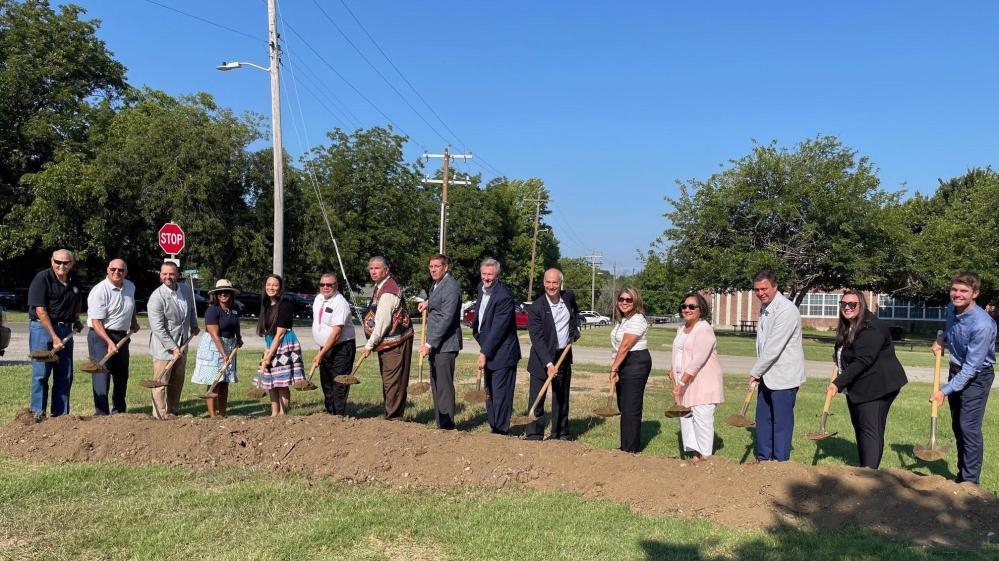
- Details
- By Chez Oxendine
- Real Estate
One in five children are homeless in Wewoka, Okla., where the poverty rate approaches 30 percent. Now, a Native-led initiative aims to change that reality through teen homeless shelters positioned strategically across from the local high school.
The Housing Authority of the Seminole Nation secured its second $500,000 grant through the Federal Home Loan Bank (FHLB) of Topeka to support a pair of four-bedroom shelters that will provide emergency housing for homeless youth who are couch surfing, living without adult supervision, or sleeping on park benches.
“It’s going to be a place where they can just be — to sleep, to learn, and to get through school and life,” Thomasene Osborn (Muscogee [Creek] Nation), Homeowner Assistance Fund manager for Seminole’s housing authority, told Tribal Business News.
The funding comes through FHLB Topeka’s Native American Housing Initiative (NAHI), which distributed $5.3 million across 12 Native housing projects in 2024 — up from $3.8 million the previous year.
Seminole, Okla.-based Security State Bank partnered with the tribal housing authority on the shelter project, which is expected to complete construction in late 2024 or early 2025. A second grant of $500,000 will fund live-in staff and furnishings.
“That’s emergency shelter for those who need it immediately, and a resource for those who need a home with an adult,” Jesse Grandstaff, Security State Bank vice president and loan officer, said.
In the same funding cycle, FHLB Topeka awarded $500,000 to the Cherokee Nation to expand its Galitsode development in Tahlequah by two homes — part of the tribe’s effort to address an 8,400-unit housing shortage on the nation.
Cherokee Nation Housing Authority director Todd Enlow said the affordable housing development, which currently offers 24 three-bedroom homes at $600 monthly, will eventually fill all 50 available lots.
“This is an incredible impact that will help relieve that burden of a housing shortage,” Enlow told Tribal Business News. “It’s going to change the lives of the families who move in there.”
The expanded NAHI program distributed grants across tribal communities in Oklahoma, Nebraska, Colorado, and Kansas. Other projects include:
- $333,265 to Citizen Potawatomi Nation in Shawnee, Okla., in partnership with Exchange Bank, Kearney, Neb., for rehabilitating 20 units, including bathroom accessibility improvements and replacements of water heaters and softeners for low-income tribal elders
- $500,000 to Iowa Tribe Housing Authority in White Cloud, Kan., in partnership with Chickasaw Community Bank, Oklahoma City, to build three energy-efficient three-bedroom, two-bathroom modular homes on tribal land
- $500,000 to Muscogee Creek National Department of Housing in Okmulgee, Okla., in partnership with Chickasha Community Bank, Oklahoma City, for land purchase and infrastructure development
- $500,000 to Northern Ponca Housing Authority in Norfolk, Neb., in partnership with First National Bank of Omaha, for down payment assistance up to $25,000 for 10 households and repair costs up to $10,000 for 25 homeowners
- $480,233 to Prairie Band Potawatomi Nation in Mayetta, Kan., in partnership with CoreFirst Bank & Trust, Topeka, for drainage repairs to prevent flooding in low-lying homes
- $500,000 to Southern Ute Indian Tribe in Ignacio, Colo., in partnership with First National Bank, Cortez, for maintenance including windows and water supply improvements for at least 20 homes
- $500,000 to Ute Mountain Ute Tribal Council in Towaoc, Colo., in partnership with First National Bank, Cortez, to rehabilitate four to six homes
- $500,000 to Kickapoo Housing Authority in Horton, Kan., in partnership with GNBank NA, to repair approximately 20 homes
- $250,000 to Sac and Fox Housing Authority in Reserve, Kan., in partnership with Bank of Blue Valley, Hiawatha, for rental property maintenance and additional housing for larger Native families
- $250,000 to Tonkawa Tribe of Indians in Tonkawa, Okla., in partnership with First National Bank of Oklahoma, for repairs including roofs, HVAC units, plumbing and windows
Demand for NAHI funding surged after the 2023 pilot program, prompting FHLB Topeka to expand from $3.8 million to $5.3 million this year. The program also reached Colorado for the first time, funding projects with both the Southern Ute and the Ute Mountain Ute.
“We designed it to be very easy to use, easy to access,” FHLB Topeka Community Investment Officer Kylie Mergen told Tribal Business News. “Through word of mouth and people seeing the results of last year, the grant expanded beyond that initial border.”
The funding for the grants comes from FHLB Topeka member banks’ voluntary 2.5% community impact contribution — set to double to 5% next year, signaling room for program growth.
In a statement provided to Tribal Business News, FHLB Topeka president and CEO Jeff Kuzbel echoed the sentiment.
“Once we saw the quality of requests from Native American tribes across our district, we knew we could do more to help,” Kuzbel said. “This flexible program is a model that works to serve Native American communities.”
